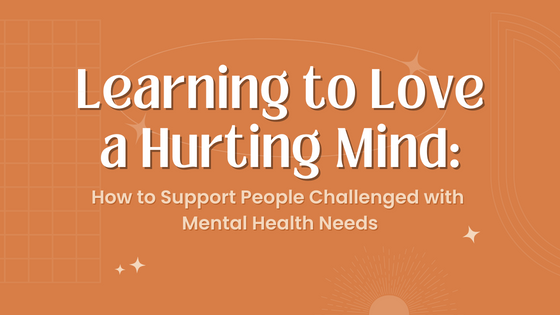The entire mental health community of professionals and advocates will say that the top priority when providing aid to someone in crisis is to reassure them and provide hope. No matter what type of professional assistance or service that they might need, the basis of this kind of service is always comforting, strengthening, and bearing the light in the darkness for those in need.
Knowing this is the foundation of addressing and treating mental health needs, the practice of caring for those challenged becomes far more open and subjective as to what will be effective. This is only compounded by the fact that each case must be individualized and tailored to a specific person. However, with enough dedication from both the sufferer and the server, the challenges become far more manageable and easier to move forward from.
So, what role can we play in healing for people challenged with mental health needs? How can we address their needs when we have neither the training, experience, nor knowledge of the professionals?
The very simple and straightforward answer is this: listening and speaking. Both are incredibly important and incredibly difficult to practice well for those challenged by mental health.
There are three words that I think give us a strong foundation for learning how to listen (and they come with a handy alliteration): initiative, invitation, and intentionality.
Initiative. Every conversation requires a space in which to happen, and, unfortunately, people challenged with mental health needs often feel unable to start their journey. Whether they specifically feel isolated, misunderstood, or suspicious of professionals, the underlying theme is feeling unsafe and uncertain. They fear what revealing their challenges will do to their friendships and relationships, holding onto major guilt and shame about their needs. This is due to stigmas, fears of vulnerability, and other things that the society around us has set up as shameful or worthy of guilt.
That is why it is up to us to both begin to change the culture and start the conversation with them in an entirely safe environment. We must take the initiative to destigmatize the social sphere and allow every voice and experience to have space where they will not be made to feel ashamed or guilty for speaking up. We do this by how we live, how we interact with others, how we show ourselves to be a trustworthy support system for an individual in need.
Now, invitation. The initiative step is far broader than this next idea, since the target is broader. Invitation is more effective on an individual level. It is the action of directly engaging an individual. It is sitting down with someone and inviting them to share. We don’t want to force someone to disclose something that they are not able or ready to address, but we can voice our concern. We can notice and let the person that is challenged know that we see them and are willing to be present for them. We must listen without judgment and hear what they need to say without interruption. We invite them into a safe conversation where we can practice active listening and, hopefully, empathy.
We are the external person who invites those challenged to find connection and fill the social need that is within everyone. Often those challenged with mental health needs can raise our awareness to larger problems within the society or community. This becomes another way for us to learn and grow in our empathy and grow into better, more attentive advocates for this community.
Finally, intentionality. I have mentioned presence more than almost anything in this series of posts, and with intentionality, I mean just that. If we are intentional with our physical presence, emotional presence, and intellectual presence, the people around us will recognize that and know that they can express their needs to us, especially people who feel isolated and alone.
True presence of mind, heart, and body requires a deep intention to listen, to understand, and to love unconditionally, regardless of the speaker’s views or beliefs. True presence is the dedication of your time to support and care for the individual in need. True presence is a vow to stand firm in the whirlwind of emotions and struggles and be an anchor for the person in need.
Before I move on to speaking, there is something that must be addressed before anything else: sometimes you do not need to speak. Sometimes all that is needed is a listening ear, and there are times you won’t have anything to say. That is okay. We are not trying to solve problems; we are giving a helping hand to those in need of support.
If you do speak, keep these things in mind: does it make the person feel seen and heard, and is it providing hope? Though the act of speaking seems very different from listening, the same three words apply to speaking: initiative, invitation, intentionality.
Initiative. Taking initiative to begin the conversation to comfort or ask a question is, again, providing the space that the individual needs to feel safe and loved. It shows how present you are with them and that you are actively caring for them.
Invitation. Extending an invitation of hope and community is the reminder that they are supported and heard. Sometimes this takes the form of offering advice, sometimes it is asking what you personally can provide for them, and sometimes it is directing them to someone who can help them further.
Intentionality. Finally, intentional speech seems a little more obvious. The words that you say to those suffering can impact the hearer for life, so we must choose our words with care, making sure that they remind those challenged of our love and warmth and want for their well-being.
So, with our alliteration in mind, I ask you to take the initiative to listen and speak, invite change surrounding the stigmas related to mental health needs and challenges and live with and love those who are experiencing mental health challenges with intention. Speak to provide hope and reassurance.
Sometimes, what we are capable of addressing does not match what an individual challenged with mental health needs. When this happens, don’t try to force yourself to help or berate yourself for being incapable. Instead, offer to help connect them to someone who can help them where you cannot. Reassure them that you are not leaving or passing them off but rather ‘tag teaming’ with someone more qualified. This could be a mental health professional, a spiritual counselor, or simply someone with more life experience. Again, you are not abandoning them. You are still their support system, a person that they trust.
Over the past four days, I have tried to provide a very basic framework from which you can begin your journey into being both an advocate and a support system for those challenged with mental health illnesses.
Tomorrow, I will share stories of mental health success and advocacy work to show how and where people heal.
– Maria Lotti, YES Intern

